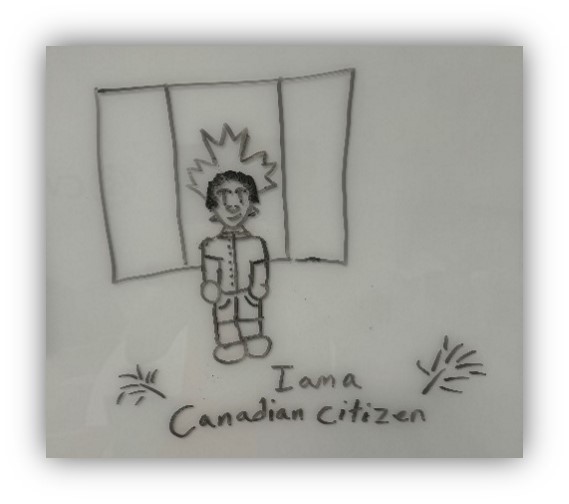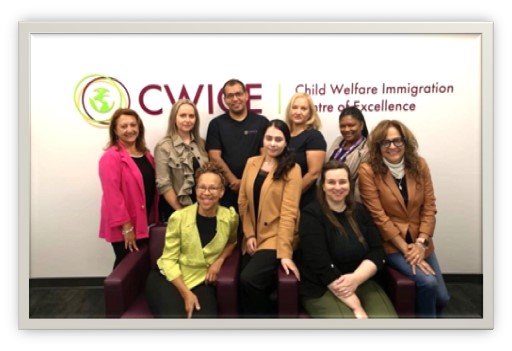
Welcoming Week
Welcoming week is an important week in Canada, celebrating all that refugees and immigrants contribute to the fabric of Canadian life. We support Immigration, Refugees and Citizenship Canada (IRCC)’s vision of a welcoming week across Canada that promotes inclusion, gives voice to and acknowledges the impact of immigrants, and helps ensure more and more people see themselves represented in our diverse communities.

Over the last year, it has been our team’s privilege to continue to support children, youth, and their caregivers in many immigration processes and in obtaining Canadian citizenship. This milestone, particularly when they take their oath of citizenship virtually from our office, is a profound moment we cherish alongside their excitement. We are proud IRCC has ensured Indigenous history and culture is embedded throughout the citizenship process and oath ceremonies. Recently, one youth was so happy when he obtained citizenship that he left us a message and drew this image on our white board while smiling ear to ear with his kinship caregiver.
We know the struggles that children and youth may have to get to the point of citizenship – some may not even have access to their identity documents or memories of their family’s migration history. Some children have lived in Canada for years and feel a sense of belonging already, and are then surprised to learn they are not citizens. In fact, we’ve seen a youth go into crisis when they learned they were not a citizen and this had a destabilizing effect. We cannot underestimate the importance of a sense of belonging, permanency, and safety to one’s identity. At CWICE, we welcome all our clients, regardless of immigration status, and open our doors to help folks navigate and regularize their status. We place a heavy emphasis on the importance of Canadian citizenship, for children and youth but also caregivers alike.
On the day a kin caregiver recently became a Canadian citizen, she told our team “Don’t forget my granddaughter needs to become a Canadian citizen. Put it in your calendar.” It is so important to us that people feel this supported and that they want to maintain contact with us. In many ways, we’ve operationalized the social safety net that exists in Canada. It is becoming more and more common for people to maintain contact with us, letting us know how their families are doing, long after we provide services. As a child welfare organization, this is important as historically it would not have been as common. Sometimes they even tell other people in their networks to call for help. We believe that our team, mostly immigrants themselves, have been strong advocates over the years and that this promotes a welcoming and inclusive space for clients.
In our sector, we hope our colleagues across the country that provide child welfare services can join us during welcoming week. We encourage you to listen to the stories, experiences, and needs of our clients. When you see children arriving from different countries, remember we often have an invisible North American lens that we apply which helps us interpret information, however children and youth can grow up differently in different places. Some youth arriving may seem more mature or have had more responsibility to deal with in their short lives. We need to ensure we understand people may have had experiences where they fear persons in authority, so be knowledgeable about community-based and culturally responsive services. Research what may be available and feel free to consult CWICE for recommendations while you’re providing services.
In CWICE, we always recognize that we owe immense gratitude to Indigenous, First Nations, Metis and Inuit communities as they have shared this land with us and generations of settlers. Like our team, this is a country of immigrants, and it is a privilege to welcome the experiences, skills, talents of others to this land. To our child welfare colleagues – please ensure you ask our clients about their identities and ensure identity based data is fully represented. Be aware of xenophobia that is occurring in Canadian media and social media today – from the use of inappropriate and incorrect language to messages displaying anti-immigrant sentiments. We encourage you to support our clients so they feel welcomed, and promote positive messages that accurately present the impact and contributions of immigrants.
For more information, please visit: Welcoming Week toolkit (canada.ca)

Pictured (standing l to r): Claudia Obreque, Alicja Grabarczyk, Thomas Abraham, Zrinka Buric, Celistine Frampton; (sitting l to r) Fatima Mukai, Ghezal Wallid, Danielle Ungara, Rosario Elmy
